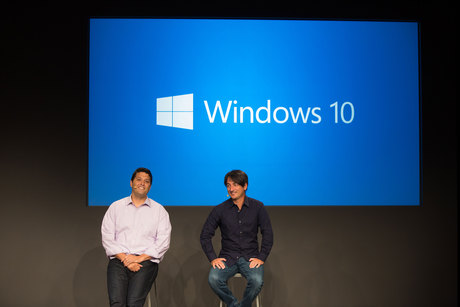Microsoft to offer Windows 10 as a free upgrade

Microsoft has unveiled more details of its upcoming Windows 10 OS, including plans to offer the software as a free upgrade to all customers running Windows 7 or newer.
On the Windows Blog, Terry Myerson, Microsoft executive vice president of operating systems, said the upcoming OS will mark the start of the company offering Windows as a service.
Windows 10 will be offered as a free upgrade for a year after launch, and once users have upgraded, the OS will be continually updated to add new features without waiting for the next major release. This suggests that Windows 10 could even be the last standalone Windows version, or at least that Microsoft may be abandoning its cycle of launching new Windows versions every few years.
“We think of Windows as a service - in fact, one could reasonably think of Windows in the next couple of years as one of the largest internet services on the planet,” he said. “And just like any internet service, the idea of asking ‘What version are you on?’ will cease to make sense.”
Ovum Analyst Richard Edward stated that Microsoft has been exploring ways beyond unit sales to generate revenue from Windows. “We already know that it is building a single app store to coincide with this release of Windows, but it could also link Windows 10 upgrades to new products and offerings, as well as those that exist already,” he said.
Forbes contributor Gordon Kelly lauded the decision to offer the OS as a free upgrade, noting that this could be the incentive needed to convince consumers turned off by Windows 8 to adopt the new version. But he noted that Microsoft does not have an advertising network comparable to Google’s AdSense, so offering Windows for free is a gamble that Google did not have to take with Android.
But the continual update policy is raising eyebrows in the famously slow-to-upgrade enterprise world. Analysts believe Microsoft will require enterprise customers not wanting to keep pace with the Windows upgrade cycle to pay for the privilege of maintaining a slower upgrade path, Computerworld reported.
Myerson also revealed more details of the upcoming launch, including plans to introduce Microsoft’s Cortana personal digital assistant into Windows 10, marking the first time it will be available on PCs and tablets as well as smartphones.
He offered a brief preview into the browser that is being designed to replace Internet Explorer, currently code-named Project Spartan. The web browser will introduce features including the ability to annotate directly on the webpage and integration with Cortana.
Windows 10 will also introduce universal applications designed to work across smartphones, tablets and PCs, including Office apps, multimedia players and messaging apps. Content will be stored and synced through Microsoft’s OneDrive cloud storage service.
As previously revealed, Windows 10 will be designed to work on a broad category of devices, ranging from PCs to IoT objects.
But CNet notes that despite the assertion that all categories of devices will run “Windows 10”, there will still be multiple versions, including those customised for desktops and mobile devices respectively. Likewise, only the Windows 10 Desktop SKU will be able to run Win32 apps, while the mobile SKU will not. The Desktop SKU will run on any Intel chip, but OEMs may not see the market for small form factor Windows devices that run Win32 apps.
Last week Microsoft also revealed that Windows 10 will provide APIs designed to turn the OS into the first holographic computing program using dedicated smart glasses known as Microsoft HoloLens. The device allows users to navigate and interact with apps using gestures and voice queues.
Driving data efficiency: three strategies for modern organisations
Achieving data efficiency is critical for sustaining organisational growth in the face of...
AI at scale demands a new approach to data resilience and privacy
Data Privacy Week is a timely reminder that taking control of your data is a strategic...
Australia's path to AI sovereignty lies in strategic control, not reinvention
Many argue that Australia's priority should be building sovereign AI infrastructure and...




